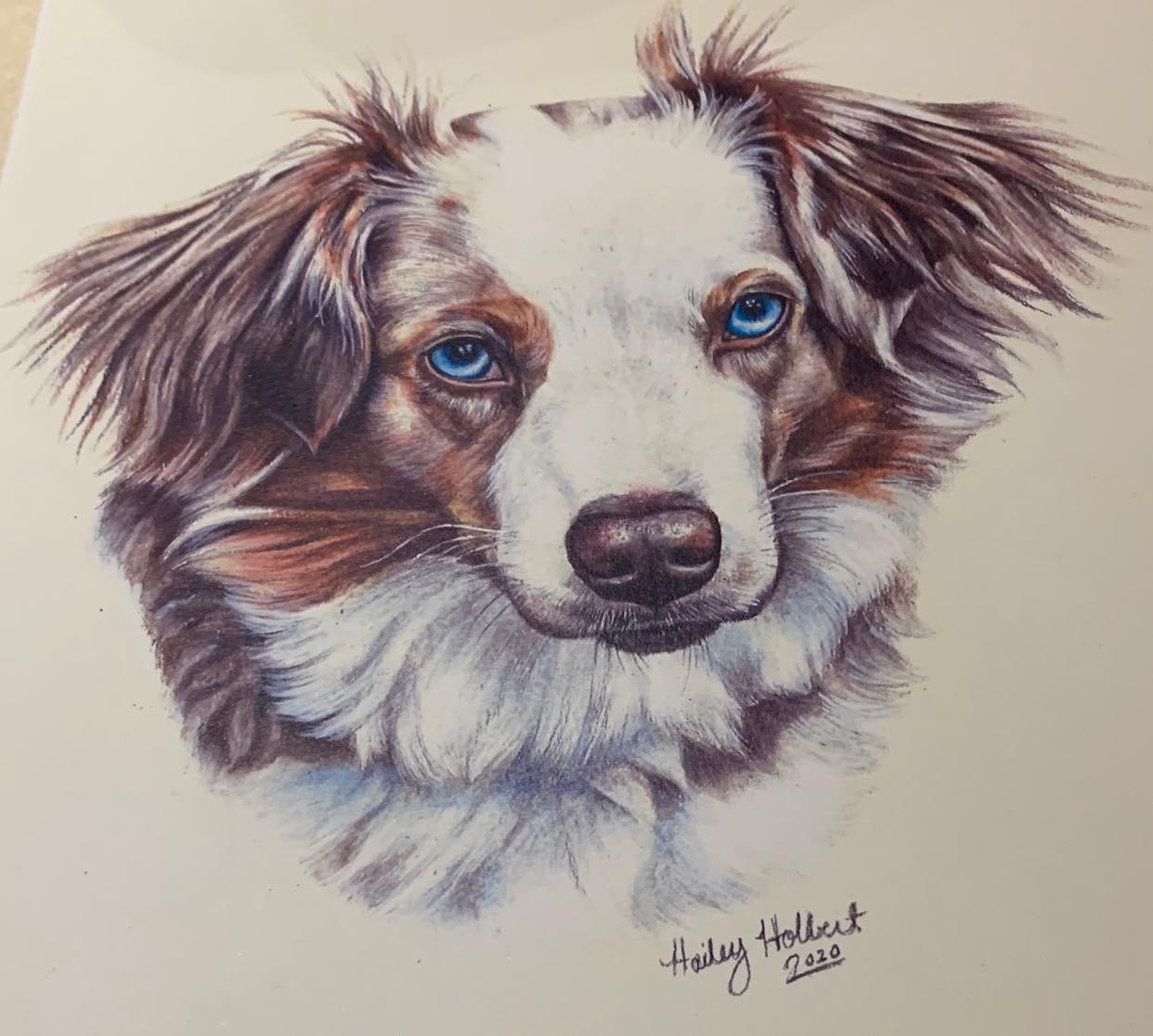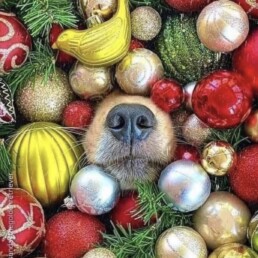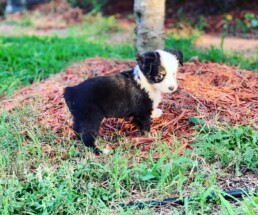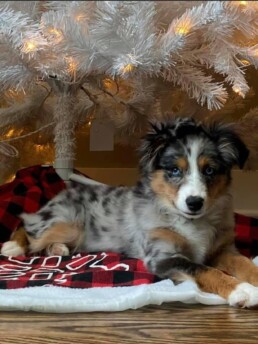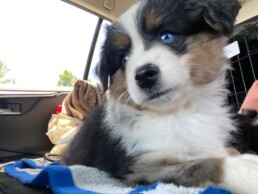Should we get a puppy for Christmas
Should we get a Puppy for a Christmas gift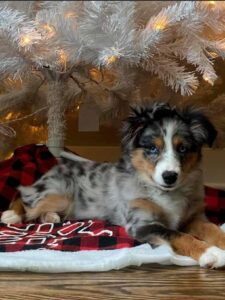
Everyone dreams about getting a puppy as a surprise Christmas gift. The epic Hallmark moment of walking in the door with a gift box decorated with a big red bow. The beautiful box is enthusiastically open and surprise a cute puppy jumps out and licks the lucky person all over the face! Such a special moment, just like in the movies….right?
Should we get a puppy for a Christmas gift
This Christmas could be an epic lifetime memory or a lifetime of neglect for that sweet puppy.
Things to consider before giving a puppy for a Christmas gift.
Let’s look at the things to ask yourself before you adopt that sweet puppy for your special person as their Christmas present.
Lets ask ourselves a few questions before getting that puppy as a Christmas gift
Has the person you want to buying the furbaby for been asking for a pet?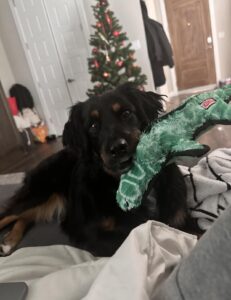
Has it been a goal of the person you are gifting to own a dog?
Is everyone in the family onboard with the responsibility of raising a puppy?
Is this a breed the family has wanted and are fully aware of all the breed traits and temperaments?
The puppy will be up at night whining and crying for several nights will that interrupt work schedules?
Does the person have a fenced in yard or will they have to walk the puppy?
Where will the Aussie stay while people are at work and school?
Are out of pocket vet bills within their budget? Vet insurance is available to purchase. Can they afford either of those options?
If the answer is yes to all of the questions above get the puppy for Christmas!
When should we not get the puppy as a Christmas gift?
If the gift is for a child and the parents have said no please don’t go against the families wishes.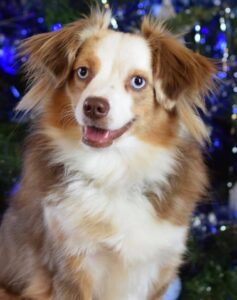
Does the gift receiver have a history of keeping a dog for its entire life or do they run through pets like out of style shoes?
If the person has just lost a pet and you want to relieve the grief of that loss this might not be the right time for them. Please have a conversation with them about where their heart is during the grief process. They might not be ready yet or prefer to get a different breed than the one that they lost.
If there has been no research done on the attributes of the breed and you “just saw a cute puppy” you might be in for more than you anticipated.
Have the parents been health tested by a responsible breeder to ensure as much as possible the long term health of the pup as it matures into adulthood? If you want Santa to visit your family see our available puppies here
My goal is to ensure that every puppy Santa brings as a Christmas gift stays under the Christmas tree until the day it goes over the rainbow bridge. Merry Christmas from all of us at Rhyse’s Toy Australian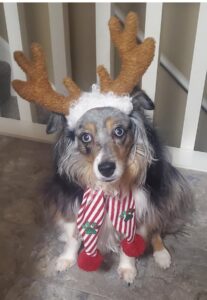 Shepherds!
Shepherds!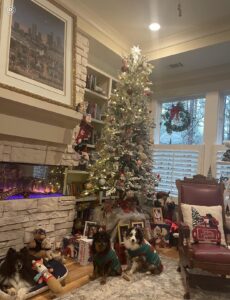
Stimulation = Urination Do it Outside
Stimulation = Urination Do it Outside and they will!
Some of us have challenges housebreaking our puppies. This article is for all of those who like myself have faced these challenges. Let's look at some common scenarios and dog training tips that will effectively help your puppy learn to respond to you.
Scenario #1
You get up in the morning and let your puppy out of the crate to go outside and go bizzy, they have been in their crate all night so they must have to go pretty bad ... right? You let the puppy out in the fenced yard have your coffee then let them come back inside and bam.... the puppy does his business in the house! Wow my puppy is dumb, I will never get him potty trained!
Scenario #2
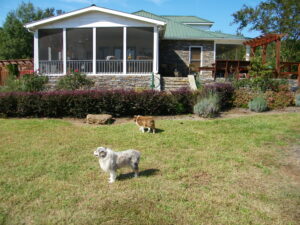 The puppy has been outside in the fenced yard for hours so you let the puppy inside. The kids are playing fetch in the family room with the pup while you are preparing dinner. Not 10 minutes go by and bam... the puppy goes bizzy in the house! I think my puppy is broken. Geez will he ever get housebroken?
The puppy has been outside in the fenced yard for hours so you let the puppy inside. The kids are playing fetch in the family room with the pup while you are preparing dinner. Not 10 minutes go by and bam... the puppy goes bizzy in the house! I think my puppy is broken. Geez will he ever get housebroken?
Scenario #3
I walk outside with my puppy to go bizzy & he just stands there looking at me. I wait for 10 minutes and it seems like the stare down is really all he is interested in so we go back inside. We get back inside the house and I give him his favorite toy then we start playing tug of war. Bam my puppy goes buzzy grrrr I just took you outside! What a bad dog!
What do the above scenarios have in common?
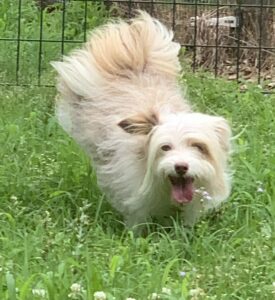 Scenario #1: You let the puppy go outside alone. What did he do out there while you were having your coffee? The pup probably waited for you to let him back in, he hasn't had contact with you all night. Then you let him in and give attention/play then he urinates. Why? He was stimulated by the play time and felt the comfort of being with you after an extended time of being apart. He relaxes and so does his bladder! Stimulation = Urination.
Scenario #1: You let the puppy go outside alone. What did he do out there while you were having your coffee? The pup probably waited for you to let him back in, he hasn't had contact with you all night. Then you let him in and give attention/play then he urinates. Why? He was stimulated by the play time and felt the comfort of being with you after an extended time of being apart. He relaxes and so does his bladder! Stimulation = Urination.
Scenario #2: The puppy has been alone waiting for companionship, probably sleeping under a shade tree. You call him inside and assume he has done all his business, right? The puppy is so excited to be back with the pack he starts playing and you happily engage. The puppy squats and pees! You have stimulated the puppy through play assuming that he would have already gotten all of that out of him when actually he was just sitting out there waiting for you to be with him. Stimulation = Urination once again.
Scenario #3: You assume that you have given the puppy enough time to do his business so you go back inside after the stare down. Then you play and he pees... you got it stimulation = urination. What was the stare down about? The puppy can't pee on demand, can you? So he was looking at you to give him direction on what you wanted from him. If you had engaged in playtime outside he would have relaxed and the stimulation from play would have led to elimination.
Solution: Do it outside and they will
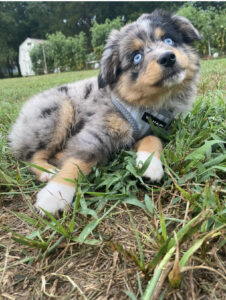 Play with your puppy outside to encourage stimulating the need to relieve themselves. When a puppy is born they are unable to defecate or urinate without the Momma dog licking the area to stimulate the act. Your puppy does grow out of that need and is able to relieve themselves without the mothers help at 3 weeks old. The natural act of stimulation to encourage elimination is a natural born response. The more you play with your puppy outside and let them eat and sleep inside the sooner your puppy will learn to ask to go outside to go potty. The common mistake puppy owners make is spending more time inside than outside with your Toy Aussie puppy. They get confused and flip the instinct to go outside to the feeling that inside your home is the potty place.
Play with your puppy outside to encourage stimulating the need to relieve themselves. When a puppy is born they are unable to defecate or urinate without the Momma dog licking the area to stimulate the act. Your puppy does grow out of that need and is able to relieve themselves without the mothers help at 3 weeks old. The natural act of stimulation to encourage elimination is a natural born response. The more you play with your puppy outside and let them eat and sleep inside the sooner your puppy will learn to ask to go outside to go potty. The common mistake puppy owners make is spending more time inside than outside with your Toy Aussie puppy. They get confused and flip the instinct to go outside to the feeling that inside your home is the potty place.
In summation play more with your puppy outside during those periods of time they should eliminate. That is 30 -45 minutes after meals and before and after bedtime. You will see a huge difference in your housebreaking success! So be assured your puppy is not dumb, broken or a bad puppy. See our puppies here
For a lifetime comprehensive training program I highly recommend Baxter and Bella online training school here get 20% off using my discount code GTAS.
Barks and wags, Rhyse
Ouch! Stop nipping
Nipping
Never allow them to put their mouth on you or start nipping on your hands, fingers, toes or clothes no matter how “cute” it is when they are babies!
Correction: A firm "No bite", redirection to a chew toy.
Are they nipping because of teething?
Solution:
Try different frozen things for them to chew. Teething toys, bully sticks, uncooked beef bones (no rib bones). A Healthy option is carrots either baby carrots or the large ones cut up.
Place them in a ziplock and freeze them.
After any chew object get to small discard to avoid choking. 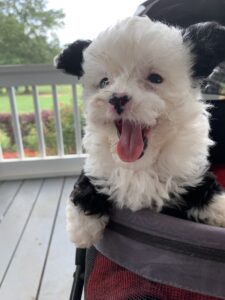
Is your puppy nipping because he/she are tired?
Allow many naps during the day, when they start getting really nippy and a firm no bite and a toy doesn’t seem to deter them…it is nap time.
Naps are so important. Your pup should be sleeping more than they are awake. They are still babies. This is not a punishment but a removal from over stimulating and quiet time.
Consistency and praise really pays off. This takes patience.
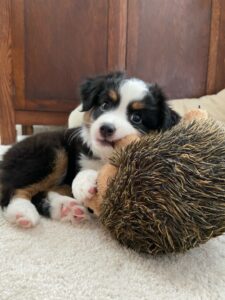
Is the Aussie nipping out of boredom?
Try puppy mind games that you hide kibble in. Lick mats, toys with texture help with teething. See some examples here.
After any chew object get to small discard to avoid choking.
Outdoor games and activities several times a day are very important but don’t forget mind stimulation is equally important!
Be patience, consistent & praise.
Remember you are building a lifetime relationship that you will never regret!
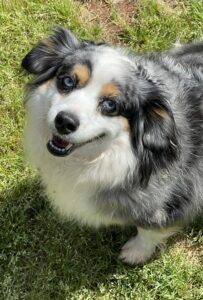
#toyaustralianshepherd
#lovemyaustralianshepherd #toyaussies
How Dogs Learn
HOW A DOG LEARNS GOOD BEHAVIOR
Dogs are instinctual and are influenced by patterned behavior.
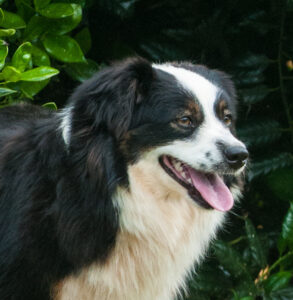 LEARNING BY TRIAL & ERROR
LEARNING BY TRIAL & ERROR
A dog that is investigating a porcupine might not get hurt the first couple of times. However, the time they get hurt by a quill they will learn not to bother the porcupine again.
REWARDED BEHAVIOR IS REPEATED
Your dog will continue behaviors that offer reward or favorable outcome. Our trial-and-error friend sees a porcupine again and chooses to move out of its way.
A puppy that investigates the counter-top because it can smell something good jumps up and steals the food. They will counter surf again in search of a reward for their behavior.
Any behavior that is met with praise and reward will teach the dog to repeat the behavior.
GIVE ATTENTION FOR GOOD BEHAVIOR
When your dog/puppy is barking inside their crate out of boredom, continue to ignore them. When they have willingly chosen to be quiet then I can let them out of the crate. I showed them they have to be quiet to be let out.
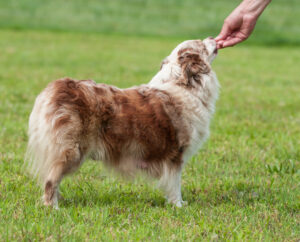
Call your puppy’s name from across the room when they come over you will give them a food reward. Your little friend gets out of the house later that day, but you are able to safely recall them by calling their name and they respond expecting a reward that you give them the moment they return to you.
Dogs do learn to avoid behaviors that have negative outcomes or correction.
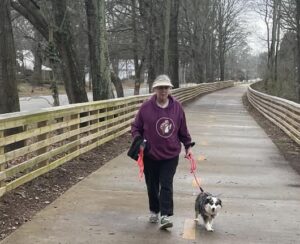 A DOG LEARNS BY REWARDS AND CORRECTIONS
A DOG LEARNS BY REWARDS AND CORRECTIONS
They will adjust their behavior accordingly. A dog rewards itself by sniffing and scavenging the ground when walking if they are not redirected by their person. They will continue to do so because they might find food or objects when scavenging.
Your puppy will lunge at another pup and cause uncomfortable tension on the leash. He will continues pulling several times and continues to cause tension each time he lunges. After several attempts he will choose to stand relaxed on your left side.
Your puppy eagerly lets you slide the puppy coat over their head at an early age because you praise and reward them every time you place it over their head.
I will always correct or reward behavior as soon as they occur. Remember that correction and reward affect the outcome of later behaviors.
I JUST DON’T UNDERSTAND
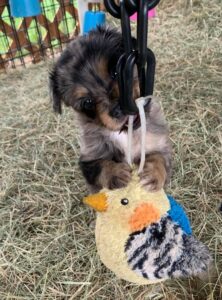
You cannot correct a dog that got into the trash 10 minutes ago when you just discovered the trash on the floor. They will not understand why they are being corrected.
The puppy bites another puppy too hard when they are playing and the other pup snaps their teeth quickly in your pup’s face as a warning. The correction was timed well so your pup understand that the other pup doesn’t want to play roughly.
Never correct behaviors like housebreaking accidents, counter surfing, getting into the trash, or destructive chewing if you did not see them do it. You have to think like a dog to train a dog.
Before Puppy Comes Home
Before Puppy Comes Home
Setting your new puppy up for success!
Preparing for your puppy
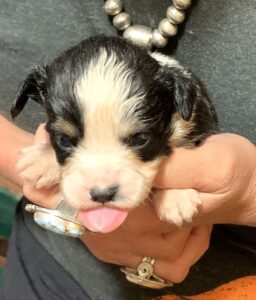 If you have raised a puppy before, you know how curious and investigative they can be. There are certain items in your household that can be dangerous for the puppy that we prefer the new furbaby not to come in contact with. Prior to bringing the pup home, we recommend that you do the following:
If you have raised a puppy before, you know how curious and investigative they can be. There are certain items in your household that can be dangerous for the puppy that we prefer the new furbaby not to come in contact with. Prior to bringing the pup home, we recommend that you do the following:
- Lift and hide any television, phone, or electrical cords within the puppy’s reach.
- Keep the floor clear of items that you don’t want your toy Aussie to have, such as children’s toys, slippers, socks, magazines, or books.
- Consider temporarily removing expensive & small area rugs, especially those with fringed edges.
- Raise house plants from the puppy’s level. Many can be poisonous if ingested.
- Take steps to ensure that your little buddy doesn’t get into lower kitchen or bathroom cabinets that usually contain cleaning products. You can purchase child safety latches, or tie something around the handles that hold the doors together.
- Bitter apple spray is a product we recommend to prevent chewing; it is applied to wood furniture legs to discourage chewing and is available here.
- Decide on the room your new baby will sleep in. I suggest in a crate next to your bed with a towel and safe toy.
Remember these pups are pack animals and you are now their new family unit. If they are alone in a dark strange place they will cry….all night!
Your Baby is home, now what?
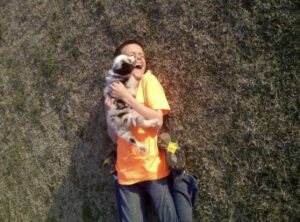 There are three ways you can keep your puppy safe during the day. One is to keep the puppy on a leash connected to your waist or belt loop, we call this Umbilicord training. You will develop a bond and be able to keep a close eye out for those “gotta go potty” cues!
There are three ways you can keep your puppy safe during the day. One is to keep the puppy on a leash connected to your waist or belt loop, we call this Umbilicord training. You will develop a bond and be able to keep a close eye out for those “gotta go potty” cues!
Another is called the tie down method. This method is like a doggie playpen. You place a 4 ft cord around the leg of a sturdy piece of furniture, then clip it onto the puppy’s collar or harness. The material of the cord needs to be chew proof
I recommend these 4 ft tie downs or these 3 ft tie downs.
Can I ever leave my puppy alone in the house?
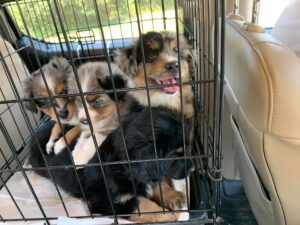 Remember a young puppy (under 6 months) must be crated or supervised at all times, then there is no way your puppy can get into trouble. When you are unable to supervise the puppy, it should be crated or in a safe fenced in yard.
Remember a young puppy (under 6 months) must be crated or supervised at all times, then there is no way your puppy can get into trouble. When you are unable to supervise the puppy, it should be crated or in a safe fenced in yard.
Once the puppy establishes good house manners, it is very important that you slowly restore plants, rugs, and other things you moved for safety, to their original locations. At that time, you will teach the puppy to respect these items and “leave it” (the command for leave it alone) when asked.
You can find more training tips here.
